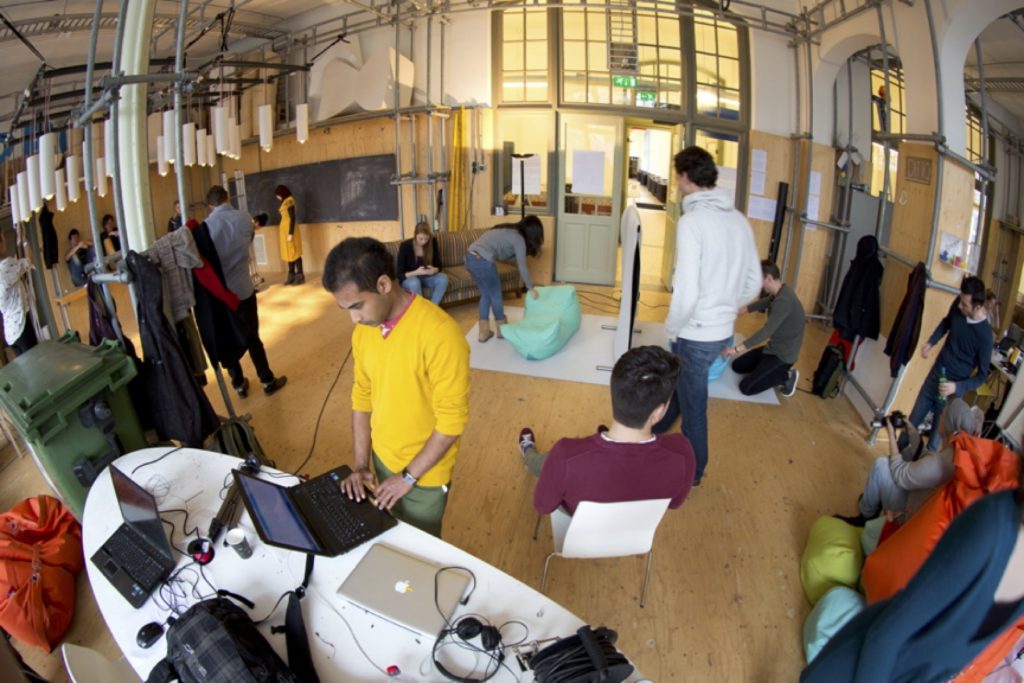Organisation
The Interactive Environments minor offers an exciting five-month ride through design, engineering and prototyping of interactive installation. Students will learn user centred design methods, interactive technologies at every scale and use materials and digital tools to fabricate prototypes.
Skills are taught through concentrated introductions: students are expected to follow their own interests, acquire technology and to actively pilots of their own learning. All of this will be applied in a concrete project with external stakeholders. Students will be working in teams as well as individually, from the development of a concept to the creation of a full-scale experiential prototype.
The Interactive Environments minor is comprehensive curriculum on interaction design in a problem-based learning style: through the experience of solving an open-ended problem we aim to develop knowledge and skills.
 Overview of all the courses in the semester of the Interactive Environments minor
Overview of all the courses in the semester of the Interactive Environments minor
The minor starts with a two-week long introduction into interaction design (Interaction Studies – 3 EC). This course is configured around a small team design assignment that enables the students to experience first-hand many relevant aspects involved with conceptualising and developing tangible interfaces for interactive products.
After Interaction Studies, we start with the core of the minor, the design course for a real-world design challenge (Design & Prototyping Studio – 15 EC). This course spans the whole semester and is broken down in 2 quarters. The first quarter (Q1) is about developing a concept for an interactive installation, the second quarter (Q2) is about the realisation of a full-scale prototype and about representing that in an exhibition. Each quarter is divided into phases, each phase is ended with a presentation moment. The presentations are in an exhibition style and will be visited by coaches and external experts. During the exhibition the student will receive feedback from the external experts. The exhibition result is assessed by the coaches.
During Q1, next to working on the real-world design challenge, we offer skill building activities for two days each week. One day is for developing technology skills and one day is dedicated to developing design skills. The skill building activities are organised such that there is one day of introduction followed a week later by one day of applying the freshly learned skill to the assignment of Design and Prototyping Studio. The time spend in skill building activities belongs to the 5EC course called Technical Studies (for the introduction) and a 4EC course called Workshops (for the application). As such we offer 3 skill building activities during Q1:
- design skills: user research, conceptualisation and validation
- technology skills: programming interactive objects, modelling/manufacturing and developing networks of interactive objects
At the start of Q2 a new design challenge is formulated for the course Design & Prototyping Studio. The character of the work during Q2 is focused on realization and presentation of a full-scale prototype. There are five weeks to develop the prototype and two weeks to prepare the exhibition.
Throughout the entire semester we offer theory and project examples in a course called Design Strategies (3 EC). Lectures take place on Monday mornings are delivered by experts in their respective fields, since the minor topics are inherently multi-disciplinary we invite experts from computer science, design, architecture, psychology and many more disciplines. We aim to make a good fit between the lectured topics and phases in the main design challenge.
The minor is a fulltime course; it requires the student to be present throughout the week every day from 9:45 until 17:30.
There are two different kinds of hours: staff attended hours (bright colours in the schedule) and unsupervised hours (coloured with low saturation). During all staff attended hours and unsupervised hours at the Science Centre Delft the student’s presence is mandatory. Incidentally the student can skip the unsupervised hours in consultation in advance with the team members and with a notification to the course coordinator.
The course timetable has been designed according to the EC point guidelines and to make it possible to achieve the required end-results in the scheduled time.
 Part of the schedule showing staff attended hours (bright colours) and group work hours (dim colours)
Part of the schedule showing staff attended hours (bright colours) and group work hours (dim colours)
The Interactive Environments minor and the Science Centre Delft have initiated close cooperation. The Science Centre Delft is the institution that acts as an interface between the Delft University of Technology and the general public. Its mission is to open up and share cutting-edge science and research of TU Delft with people of all ages and all social backgrounds. Minor students are hosted by the Science Centre Delft in a beautiful design studio next to a workshop. This is where prototypes will be fabricated, assembled and tested, while at the same time they become immediately exposed to the curious public.

Students at work in the design studio of the Science Centre
Visitors of the Science Centre Delft can meet the minor students at work and help with testing of interactive prototypes. In this way visitors learn about of these new kinds of interactive environments and about the process, how students are creating prototypes. The activities with the visitors are an integral part of the minor program, the students expose their process and (intermediate) results to the public by means of verbal explanations, demonstrations and through exhibiting presentation material and intermediate prototypes.
Links:
